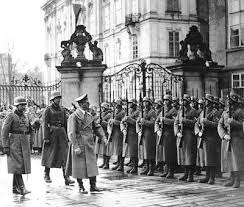The Gathering Storm
Today in History, March 15th

March 12, 2018
On March 15th, 1939, Nazi Germany occupied the country of Czechoslovakia. The occupation was bloodless, and no one seemed ready to oppose Adolf Hitler and his plans for world domination. Even at the beginning, there was very little standing in Hitler’s way, as the Germans intimidated and bullied their way into marching into tiny little helpless Czechoslovakia. The result, although indirect, would be no less than the start of World War II.
The seeds of this most fateful occupation would be planted in September 1938 with the signing of the Munich Agreement. British Prime Minister Neville Chamberlain, French President Édouard Daladier, and Italian dictator Benito Mussolini met German Chancellor and President Adolf Hitler in Munich, Germany to see what they could do to avert war. Hitler had recently been whining that the Sudetenland, a region of Czechoslovakia with a German majority, naturally belonged to the Fatherland and he and his generals were already drawing up plans to invade the region. But neither Chamberlain nor Daladier wanted war (the infamous policy of “appeasement”), and they planned to stop a general war, even if it meant giving up the Sudetenland
Following the initial agreement to give Germany the Sudetenland, Czechoslovakia became severely weakened, as the Sudetenland contained 66% of their coal, 70% of their iron and steel, and 70% of their electrical production. This draining of resources led to the pacification of Czechoslovakia; the Germans, sensing weaknesses like a shark and blood, started to incite the Slovakians towards independence. The weakness of Czechoslovakia lead the Slovakians to declare their independence from Czechoslovakia, with the support of Germany, on March 14th, 1939.
Following the self-declared independence of Slovakia, Germany threatened to bomb Prague, the capital of the Czech part of Czechoslovakia, to smithereens unless the government gave their army access to their country. Czech President Dr. Emil Hácha bent under the immense pressure and declared that he had “confidently placed the fate of the Czech people and country in the hands of the Führer of the German Reich.” Hitler, meanwhile, emphatically said “Czechoslovakia has ceased to exist!” before departing to Prague, which by the evening of March 15th the German army had already occupied. However, there was no jubilant cheering like Hitler might have expected, and you could’ve heard a pin drop that evening, spare the vehicles. But something like popular support, or rather lack thereof, didn’t really matter to Hitler, who was already tasting the blood.
At this point, the world turned it’s collective eyes to Chamberlain to see how he would react. (Daladier was a junior partner in this and would follow whatever Chamberlain said) Chamberlain responded to the hype by flatly stating that, since Slovakia had extracted itself from Czechoslovakia than Britain has no need to protect it. While the argument seems logical in a weird way, it pleased even fewer Brits than the occupation in the first place. Members of Parliament and the media roared against Chamberlain for his cowardliness and lack of courage, causing pressure to build up for either an end to “appeasement” or a resignation.
Unsurprisingly, Chamberlain chose the former, and on a speech given in Birmingham, broadcasted throughout the whole nation, did a complete 180 and apologized for not standing up to the treacherous dictator. After listing off several promises broken by Hitler, Chamberlain finished off his speech with a resolve to fight next time any such thing happened. The war-ready faction was pleased.

